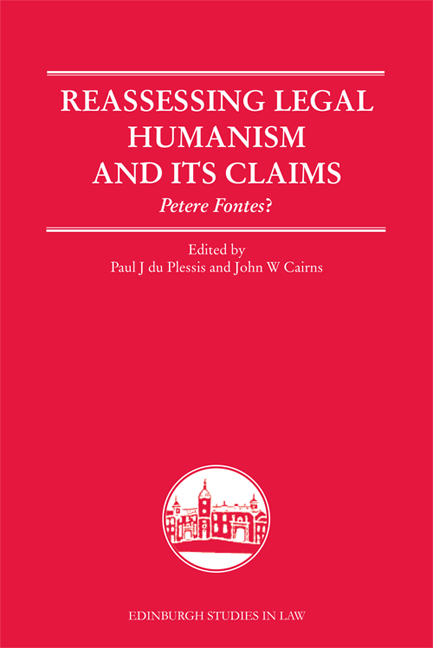Book contents
- Frontmatter
- Contents
- Preface
- A Note on Names and Book Titles
- List of Contributors
- List of Abbreviations
- Introduction
- Part I DEFINING LEGAL HUMANISM
- Part II A BREAK WITH THE PAST/CONTEMPORARY CRITIQUES
- Part III LEGAL HUMANISM: A PAN-EUROPEAN METHODOLOGY?
- Part IV LEGAL HUMANISM AND THE BOOK TRADE
- Postscript
- Index
Preface
Published online by Cambridge University Press: 05 September 2016
- Frontmatter
- Contents
- Preface
- A Note on Names and Book Titles
- List of Contributors
- List of Abbreviations
- Introduction
- Part I DEFINING LEGAL HUMANISM
- Part II A BREAK WITH THE PAST/CONTEMPORARY CRITIQUES
- Part III LEGAL HUMANISM: A PAN-EUROPEAN METHODOLOGY?
- Part IV LEGAL HUMANISM AND THE BOOK TRADE
- Postscript
- Index
Summary
The papers collected in this volume were originally delivered on 7–8 June 2013 at a conference organised by the Centre for Legal History of the University of Edinburgh, School of Law. As part of the celebration of 303 years of continuous teaching of Civil Law (ius civile) in the University of Edinburgh, the Centre for Legal History hosted an expert symposium on legal humanism, addressing the topic from a variety of perspectives. The symposium challenged and debated the common conceptualisation of legal humanism.
A traditional view of European legal history will often start– after discussion of the early medieval codes– with the rediscovery and teaching of the Corpus Iuris Civilis in medieval Italy. It then sets out this history as a progression of schools of jurists, working through Glossators, Commentators, Humanists, Natural Lawyers and Codifiers, with the enactment of the BGB almost as the end of history. It is also traditionally linked to a geographical progression– almost a translatio studii– from Italy, to France, to the Netherlands, to Germany. This is not a convincing narrative as scholars have increasingly realised over the past three decades. What of the influence of Pothier? What of the French Code? What of Spanish, Portuguese and Italian scholarship? What of England?
Legal humanism presents particularly difficult issues of understanding. Lesaffer's recent subtle study of European legal history brings home the problems and contingencies of the traditional narrative when he has to use the term “moderate humanism” to deal with the historical realities with which he is faced. The participants examined a whole variety of aspects of what is usually considered under the rubric “legal humanism”, covering the “philological” work on the Digest, humanist jurists and political thought, humanists and the legacy of Byzantium, humanists and formulae, libraries, humanism and English law, and the humanist legacy as understood in the eighteenth century, and the extent to which legal humanism was and is a meaningful classification other than for a small group of specialist writers. In this respect, the traditional distinctions between the mos gallicus and mos italicus were considered, as well as the significance in this context of the usus modernus. Sources, pedagogy, the working methods of scholars, and the book-collecting habits of lawyers were all considered and debated. This volume is the result of those deliberations.
- Type
- Chapter
- Information
- Reassessing Legal Humanism and its ClaimsPetere Fontes?, pp. vii - viiiPublisher: Edinburgh University PressPrint publication year: 2015



